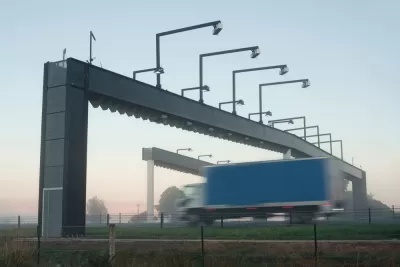'Big Brother' has long been voiced as a criticism of charging motorists by the mile driven, but in the ongoing Oregon road usage charge program, more than 75 percent of volunteer enrollees opted for a recording technology with GPS.

Privacy concerns were so important to the legislators writing the bill in 2013 to authorize the nation's first 'road usage charge' (also commonly referred to as a vehicle miles traveled or VMT fee or mileage-based user fee) program, now known as OReGO, that they required a "non-Global Positioning System (GPS)" option be included in the reporting methods volunteers could select when the program launched July 1, 2015.
According to July 1 data on the program supplied by Michelle D. Godfrey of the Oregon Department of Transportation, there are 849 "active volunteers" in the program. Prior posts on OReGO indicated that the program would enroll 5,000 volunteers, but Godfrey indicated that was the limit, and not a requirement.
"We didn’t really know what to hope for, since this has never been done before," Godfrey stated in an email. She added that the number was determined to be adequate for assessing the "purposes of a pilot project" and to demonstrate that "OReGO system could support a statewide implementation."
Technically, OReGO is not a pilot project, like the California Road Charge Pilot Program, which also allows up to 5,000 volunteers, because it has no end date. The California program lasts for nine months.
Legislators will be looking at the findings provided by the Oregon Department of Transportation (ODOT), which is administering the program, in their deliberations over a transportation funding package that begin next February. While the program is helpful in determining how motorists react to being charged by the mile driven as opposed to the gallon burned, ultimately the purpose is to fund transportation infrastructure.
As posted in April, "[Gov. Kate Brown] supported a four-cent gas tax increase last year, but it fizzled in the legislature, allowing the state to retain its low carbon fuel standard, known as the Clean Fuels Program, only the second state after California to have such a program."
Regardless of the findings from OReGO, it's clear that states will continue to be reliant on tried and true state gas taxes for the immediate future if they want to keep roads, bridges and tunnels in a state of good repair.
FULL STORY: Is Privacy Overrated as a Concern for Mileage Fees?

Alabama: Trump Terminates Settlements for Black Communities Harmed By Raw Sewage
Trump deemed the landmark civil rights agreement “illegal DEI and environmental justice policy.”

Study: Maui’s Plan to Convert Vacation Rentals to Long-Term Housing Could Cause Nearly $1 Billion Economic Loss
The plan would reduce visitor accommodation by 25% resulting in 1,900 jobs lost.

Planetizen Federal Action Tracker
A weekly monitor of how Trump’s orders and actions are impacting planners and planning in America.

Wind Energy on the Rise Despite Federal Policy Reversal
The Trump administration is revoking federal support for renewable energy, but demand for new projects continues unabated.

Passengers Flock to Caltrain After Electrification
The new electric trains are running faster and more reliably, leading to strong ridership growth on the Bay Area rail system.

Texas Churches Rally Behind ‘Yes in God’s Back Yard’ Legislation
Religious leaders want the state to reduce zoning regulations to streamline leasing church-owned land to housing developers.
Urban Design for Planners 1: Software Tools
This six-course series explores essential urban design concepts using open source software and equips planners with the tools they need to participate fully in the urban design process.
Planning for Universal Design
Learn the tools for implementing Universal Design in planning regulations.
Caltrans
Smith Gee Studio
Institute for Housing and Urban Development Studies (IHS)
City of Grandview
Harvard GSD Executive Education
Toledo-Lucas County Plan Commissions
Salt Lake City
NYU Wagner Graduate School of Public Service


























